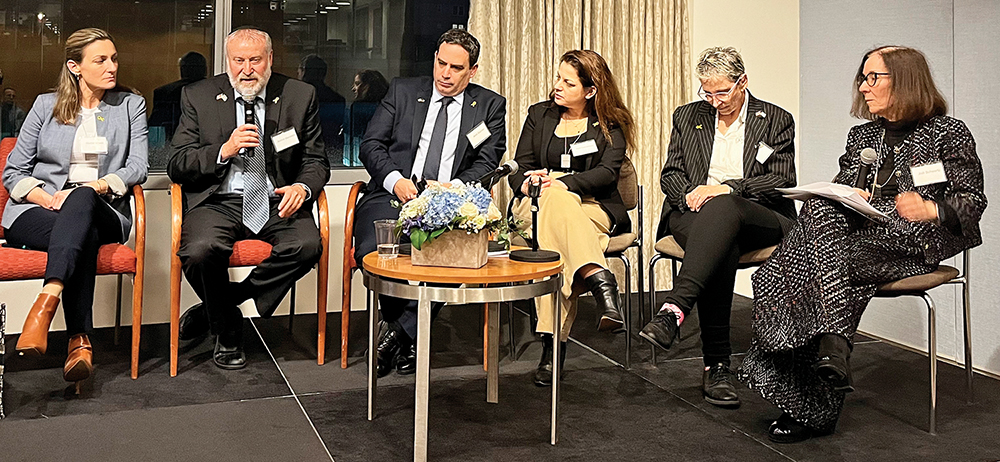
On March 6, UJA lawyers hosted a panel discussion with the Israeli Bar Association (IBA) leaders, moderated by Jodi Schwartz, UJA’s general planning chair. The conversation focused on the recent International Court of Justice (ICJ) case that South Africa filed against Israel, antisemitism and how the practice of law in Israel has changed since October 7.
Panelists included Israel Bar Association President Amit Becher; former Attorney General Avichai Mandelblit; Yonit Calmanovich, IBA’s international affairs department head and member of Israel’s judicial nominating committee; IBA Deputy President Tamar Ulman; and lawyer Hadar Israeli, partner at Barnea Jaffe Lande.
UJA Lawyers’ Chair Joseph Shenke began: “One thing that the last 152 days brought home to all of us is a symbiotic relationship between Israel and the Jewish communities of the Diaspora. We need Israel and Israel needs us.”
Describing the efforts of the legal community after October 7, Becher explained, “After they dealt with their own immediate needs, I gathered our heads and senior partners, thinking what to do towards the larger community.” Becher listed various operations and initiatives, with hundreds of volunteers assisting refugee families in legal matters. The Israeli Bar Association sent a delegation to Paris in late October to the International Bar Association. “We started speaking about the atrocities.”
Becher added they have been doing lots of legal work for those kibbutzim, for lawyers and other Israelis who were drafted, including small business owners. “We turned the organization upside down in order to reach out.”
Mandelblit discussed the ICJ case. (South Africa recently approached the court again, urging further measures against Israel in light of the situation in Gaza.) He defined asymmetric warfare as conducting war to gain military and political objectives. “Asymmetric warfare is one side obeys the rules of law of armed conflict. The other not only does not obey, but it abuses it in its favor. Combatants are mixing with civilians, especially in open places, especially places with special protections such as hospitals, U.N. facilities, schools, mosques. It’s a win-win situation for them.”
Mandelblit continued: “South Africa as Hamas’ proxy doesn’t really believe Israel is committing genocide. They want a political gain for Hamas and a military gain, stopping the war without paying the price of releasing the hostages and possibly that Hamas will still run Gaza.”
Israeli discussed the immediate reaction from the legal community: “Hotlines were created in all 27 big Israeli law firms. The legal community gathered the civilian population to provide endless means of support by raising money to help the evacuated populations.
“I think the most important part we must realize is we are officers not only of the court, but officers of our country, also,” Israeli continued. “We need to speak out very clearly to maintain and gain further international support for Israel, with our uncompromised commitment to the rule of law. We need ambassadors to make it clear to the world that we are fighting for our lives. We are fighting because we were attacked and responding in defense. We are not the ones that initiated it. First of all, check the facts. Don’t let yourself forget the facts of every situation, rule according to the law, and stay like that even if you’re attacked and facing a horrible war.”
“In Israel, we have 80,000 lawyers; 20% are Arabs,” noted Ulman, “I am a criminal lawyer. I go to jails every day to visit my clients. The Red Cross visits Hamas people. Before the war, the Red Cross brought Hamas’ prisoners toothpaste, hairbrushes, soap and family visits. After October 7, the commander of the Israeli prisoners said, ‘Hamas people will not get anything, as our hostages don’t get anything from you.’”
As head of international affairs at the Israeli Bar, Calmanovich described that “part of my job is reaching out to different bars around the world trying to cultivate professional relationships. After October 7 we encountered empathy, maybe solidarity and consolation. After a few weeks the atmosphere changed. You can call it a cold shoulder.”
Calmanovich continued: “I think the main problem is the lack of hasbara. That’s the role each of us can take. Each of us has a web of connections. Each of us knows someone who knows someone with access to influentials. I think the right hasbara is telling as many people as we can that Israel is the beacon of democracy in the Middle East. Israel is abiding by the laws of war and international laws. I think that would help immensely.”
Asked what American lawyers can do, Israeli suggested: “The biggest support we can get from the legal community is to educate this generation. Law schools have the future leaders of this and other nations. I think simply noting facts to get the record straight would help a lot.”












